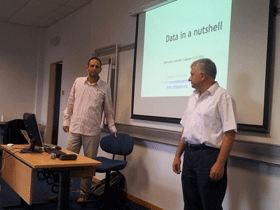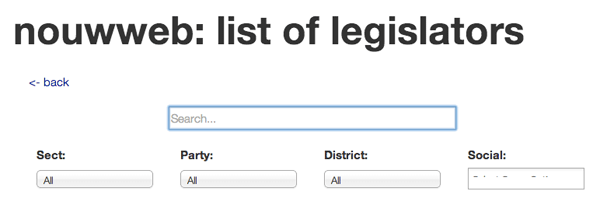This week, as part of a new initiative to promote civic engagement in Lebanon, developers from Lamba Labs and the SMEX team are launching a new tool called Nouwweb that allows people to easily access essential public information about the members of parliament who represent them. The tool aims to encourage more frequent and open exchange between MPs and the people they represent. For the moment, the Nouwweb tool is accessible only in English but will be available in Arabic soon.
Try the Nouwweb tool now.
Nouwweb organizes basic information—collected from publicly available sources—for each of the 128 deputies, including district, sect, party, official phone and mobile numbers (if available), and social media accounts for those representatives who are active on email, Facebook, and/or Twitter (not as many as we’d hoped). A simple interface lets anyone search for this information by name, sect, party, district, or social media presence.
Alternatively, web developers can build on the data via an open API (API stands for application programming interface) to create visualizations (like this one from the Sunlight Foundation of the U.S. Senate) and other tools that can facilitate citizens’ understanding of and participation in the Lebanese political process. The launch of Nouwweb also coincides with the launch of both OpenLeb, a portal where developers can present their open data projects. Soon, we’ll follow up with a series of open data challenges designed to engage a diverse community of people around the benefits of open data, especially open government data.
Open Data in Lebanon

Greek open data geek Michalis Vafopoulos (left) with ISOC Lebanon chair Nabil Boukhaled at the ESA Open Data workshop. Photo: Stéphane Bernard Bazan.
Already, there’s an increasing focus on the value of open data for both business and governance in Lebanon. Just last week, the Lebanon chapter of the Internet Society held an open data workshop at École Supérieure des Affaires in Clemenceau, where Greek open data researcher Michalis Vafopoulos demonstrated how open data can be an economic engine and how, in his experience, the financial sector is the best place to start.
Following opendefinition.org, data is considered “open if anyone is free to use, reuse, and redistribute it—subject only, at most, to the requirement to attribute and/or share-alike.” For the past several years, international organizations such as the World Bank and the UN as well as a wide range of governments have been releasing once-private datasets into the public domain to drive innovations in business, public oversight of government spending, and other forms of civic engagement. A 12-minute video produced by the UK-based Open Knowledge Foundation explains the potential of open data and gives some examples of how it’s being used.
To get involved in OpenLeb, please join the new OpenLeb Google Group, where open data advocates in Lebanon can share their work, discuss different approaches to open data, and work together to build open data tools. Subscribing to the group will also keep you up-to-date on future open data events.


